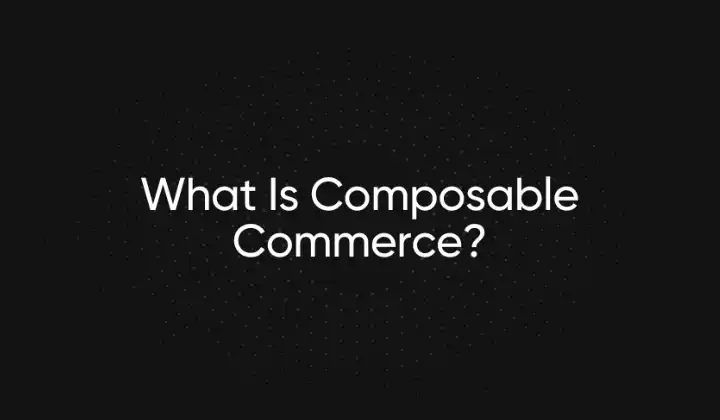
Composable commerce is a new approach to retail that is gaining traction in the online space. It enables retailers to break down their shopping experience into small, manageable components, or “building blocks,” and combine them in various ways to create customized, intelligent customer experiences. This flexible commerce technology can help retailers improve customer engagement and loyalty, increase sales conversions, reduce operational costs, and drive business growth.
विषय-सूची
Benefits of migrating to headless commerce
One of the most significant advantages of composable commerce for online retailers is its scalability. Breaking down the shopping experience into smaller components that can be rearranged as needed gives businesses the flexibility to scale up or down quickly and easily, allowing them to adjust their digital presence according to changing market conditions and customer demands. With composable commerce, retailers can leverage their web infrastructure to quickly launch new services, features, or product lines without significant investment in development or additional workforce.
Another critical benefit of composable commerce for online retailers is improved customer engagement. By breaking down the shopping experience into small components, businesses can create a personalized journey catering to each customer’s needs and interests. They can also provide customers with more detailed information about products and services as they move through different stages of the purchase process, allowing them to build stronger customer relationships by offering targeted promotions and discounts tailored to their preferences.
Additionally, composable commerce helps reduce operational costs by streamlining processes and eliminating redundancies. By breaking down the shopping experience into small components, businesses can automate specific tasks, such as order processing or customer service, to save their employees time and energy. Furthermore, composable commerce allows retailers to leverage existing web infrastructure for new services or products, so they don’t have to invest in additional development costs, making it easier to quickly launch new offerings without high upfront costs.
Finally, composable commerce promotes business growth by allowing retailers to take advantage of emerging technologies and trends while responding quickly to customer needs. This flexibility enables them to stay ahead of the competition and continually innovate their offerings to remain competitive in their market. Furthermore, by creating a personalized shopping experience tailored to each customer, businesses can increase their customer base and drive more sales conversions.
Platforms that facilitate composable commerce
Today, several platforms facilitate composable commerce for online retailers. Each platform offers different features and capabilities to help businesses create a dynamic and personalized shopping experience.
Shopify
Shopify is a popular platform for online retailers looking to leverage composable commerce technology. It lets businesses quickly set up their digital store with customizable templates and advanced features such as product personalization and customer segmentation. Furthermore, the platform integrates with various third-party tools so that businesses can add additional functionalities.
BigCommerce
BigCommerce is another solution that helps online retailers take advantage of composable commerce. This powerful e-commerce platform provides users access to numerous features designed to increase customer engagement and grow revenue. Additionally, it makes it easy for businesses to create custom product experiences that cater to individual customers’ needs and preferences.
Magento
Magento is another popular e-commerce platform on the market today. It offers various marketing tools designed specifically for composable commerce, allowing businesses to easily personalize customer experiences without significant coding knowledge or technical skill. Furthermore, it has various integrations with third-party solutions that enable businesses to build out their feature sets as needed.
WooCommerce
WooCommerce is another popular option for leveraging composable commerce technology in an online store setting. This open-source platform allows users to customize their websites according to their unique needs and requirements while offering customers a personalized shopping experience through automated processes like customer segmentation and product recommendation engines. Additionally, it provides a wide range of integrations with various third-party solutions so businesses can easily extend their feature sets.
Mach Alliance
Mach Alliance is an open-source platform that facilitates composable commerce for online retailers. It uses a plug-and-play approach to enable businesses to build, manage, and deploy their digital presence quickly and easily. The platform provides software tools, APIs, and data models that allow businesses to integrate different components into their systems with minimal effort.
By leveraging Mach Alliance’s technology, online retailers can create customized customer experiences tailored to their customer’s needs while reducing operational costs and driving business growth. Overall, MACH Alliance gives businesses the flexibility they need to remain competitive in the ever-evolving digital marketplace.
Summary
Composable commerce is a powerful tool for online retailers. It enables them to scale up or down quickly according to changing market conditions, improve customer engagement through personalized shopping experiences, reduce operational costs by streamlining processes, and promote business growth by continuously innovating their offerings. With the proper implementation of this technology, businesses can reap the many benefits of composable commerce to drive success both now and in the future.

